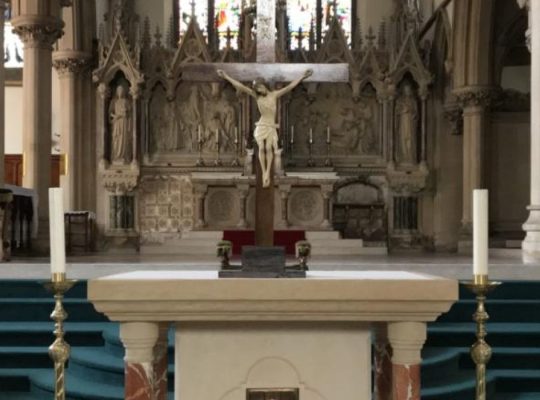Nathan’s prophecy, in our First Reading, sees its realisation in our Gospel today — in Nazareth of Galilee. ‘The angel Gabriel was sent from God’ into this obscure village where lived ‘a virgin betrothed to a man named Joseph, of the House of David. The virgin’s name was Mary.’ Today on this Fourth and final Sunday of Advent, we find ourselves on the eve of the great feast of Christmas celebrating the nativity of Christ. In today’s gospel however, we are transported back to the Annunciation, and Mary’s fiat.
When we read about the Annunciation to Mary, we should do so carefully even though we are familiar with it. Nor should we be primarily concerned with a psychological or subjective commentary on the scene that it depicts. Luke does not report the exact words of the exchange between the angel and Mary. But with consummate artistry and extreme delicacy, he constructs a story that is the divinely authorized presentation of what Mary experienced, an experience that is itself incommunicable. In an admirable structured dialogue filled with reference to the Old Testament, he relates the substance of the event to us. There is not the least concession to the picturesque or the anecdotal in this remarkable passage. It was not written to satisfy our curiosity, but to reveal a mystery and nourish our faith.
In his brief presentation of Mary, each detail is calculated to prepare us for the revelation of the mystery: the angel is sent to a ‘virgin’ betrothed to a man ‘of the House of David.’ The same is true about the first words of the angel. We usually speak of this as the ‘salutation’ of the messenger of God, and the Lectionary conforms to this usage: ‘Hail.’ Luke, it is true, uses the word ‘chaire’, which corresponds to the ordinary form of the Greek greeting. But he also knows the Jewish greeting ‘Shalom’ (Peace), which would be more natural in the Semitic context of the first two chapters of his Gospel. Thus there is every reason to believe that he chose chaire because of its primary meaning ‘Rejoice.’
‘Full of grace’ (‘O highly favoured daughter’) The Greek is kecharitomene, i. e. ‘Who is the object of singular favour.’ This is ‘grace’ (charis), If one understands the term in the sense of a ‘gracious gift’ granted by God. It can also be translated as ‘favoured.’ Whatever the translation, it is not a matter of a word or phrase that calls attention to the merits of Mary, but a proclamation that she is the recipient of divine favour. This is what the Magnificat says: ‘God who is mighty has done great things for me.’
The first words of the angel are neither a banal beginning to the conversation nor a simple salutation. Combined with what proceeds, ‘The Lord is with you’ immediately evokes a whole ensemble of expectations and mysteries. How, really, could one not think of the promise of the child whom one prophecy called ‘God- with- us.’
‘She is deeply troubled’ — not because of the praise that the angel bestows. Mary’s trouble is not of the psychological order. Luke says explicitly that she was troubled ‘by his [the angels] words,’ wondering about their meaning. Mary wonders because she perceives that the angel’s salutation has a hidden meaning: it is a mystery. The messenger confirms her intuition. He had said ‘Rejoice’, he adds ‘Do not fear.’ He called Mary by her own name after having given her the title of ‘favoured,’ justifying this by the fact that she has ‘found favour with God,’ that she is the object of a singular divine favour. Finally, the angel explains what he has announced by saying: ‘The Lord is with you.’
The conception and birth of a son is at issue. The announcement is made at first according to a stereotypical formula that is found many times in the Bible. His name? That name he will carry throughout history: Jesus. Jesus of Nazareth; the name under which we will invoke him because he is ‘God saves.’ Immediately afterward come the titles of the promised child, which are clearly messianic.
‘Great’ is fairly indefinite, this epithet was given to John. ‘Son of the Most High’ says much more, and this title is re-enforced by that of ‘Son of God’ which follows it. Then come quite clear evocations of the messianic dignity of the child to whom Mary will give birth: ‘The Lord God will give him the throne of his ancestor David; he will rule over the House of Jacob for ever and his reign will have no end.’ Thus what is announced to Mary is in line with the messianic promises of the Old Testament. What was awaited in a more or less distant future is now realised. The framework of the promise is concrete, it concerns a child that Mary will conceive and bear who will carry a certain name: Jesus.
After this, the story leaps, with consummate artistry, over an obstacle that lies in the way of the mystery. Mary asks a question that prompts the angel to reveal the answer to all this,
‘How can this come about since I am a virgin?’ Since Saint Augustine (354-430), the entire catholic tradition has thought that Mary did not understand how to reconcile the motherhood announced by the angel with her vow of virginity. Friends and foes continue to debate this interpretation, an issue of limited interest. But Mary’s holiness is by no means at stake. What the Gospel attests to can be stated clearly: that Mary, betrothed to Joseph, was a virgin. The question that she asks the angel serves to introduce what follows concerning this virginal conception, that is, the unique intervention of the Holy Spirit.
This intervention is enunciated in two statements placed one after the other’; ‘The Holy Spirit will come upon you and the power of the Most High will overshadow you.’ The first expression, or an equivalent one, is found often in the Old Testament. Luke says, with regard to the Pentecost that Jesus announces: ‘You will receive power when the Holy Spirit comes down on you.’ (Acts1:8) It is familiar to us.
By contrast the second statement is filled with meaning. It reminds us of the cloud whose shadow covered the Tabernacle and symbolized the glory of God that filled the dwelling place (Exod 40:35). It recalls the beginning of Genesis ‘The breath of God — the Spirit — moved over the waters’ that covered the empty and unformed earth, like a brooding bird that brings forth life.
The angel announces to Mary more than protective help, an intervention of both the Spirit and the creative power of the Most High will produce new life in her. What he has done in various ways from the beginning, the creator Spirit will do in Mary’s womb, causing the virgin to conceive and bear a son. Whether or not she had previously vowed virginity. Mary will henceforth always be the virgin mother. This is the mystery that God has made known to us through the message of an angel. The virtually inexpressible divine action and Mary’s ineffable experience are presented with extreme delicacy in accordance with the biblical style of storytelling.
The angel says to Mary that the son she conceives must be given the name: ‘Son of the Most High. But then there is a progression to another title which is of primary importance: ‘Son of God’ of course we understand this second title in its strongest sense when speaking of Jesus — that he is the ‘Son of God made flesh’ and as we say in the creed and we hear in John’s prologue ‘The Word made flesh.’ And that having been conceived by the power of the Holy Spirit, he has no other father than God, and therefore is God.
The epilogue to the story is short and simple. Mary receives a sign: ‘Know that Elizabeth, your kinswoman has herself conceived a son in her old age and she whom people called barren is now in her sixth month.’ This information, of course prompted the Visitation. The whole narrative ends with Mary’s acceptance: ‘I am the handmaid of the Lord, let what you have said be done to me.’ The greatness of Mary’s acquiescence to the will of God and the vocation to which she has been called needs no additional consideration. This unhesitating ‘Yes’ is sufficient basis for calling Mary blessed, the one who for her entire life listened to and kept the word, and always heeded the will of God.
No-one could have foreseen that this humble daughter of Zion would be chosen and prepared by God to be, one day, the virgin mother of the long-awaited Messiah. She herself knew only one thing: her ardent desire to serve the Lord.
On this final Sunday of Advent – this eve of Christmas, let us stay at Mary’s side as she brings forth into the world ‘The Son of God.’
‘Lord, on this vigil of Christmas,….as the last step in creation…. Come as God made man.’


